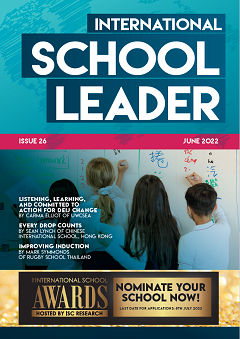By Paul Regan
Berlin Brandenburg International School won the Ethical Values Education Award at this year’s International School Awards and explains their award-winning initiative here. The judging panel considered it a model for all schools as judge Paul Regan explains.
The Berlin Brandenburg International School in Germany believes that very young children are capable of understanding the importance of thinking about values. But instead of issuing a code of conduct with in-built rewards and sanctions, it bravely encourages its students to reflect on the very notion of value and how it both consciously and subconsciously informs our thoughts and actions.
Understanding value
An ability to grasp the concept of value is considered to be a key milestone in a child’s social, intellectual and psychological development. Learning that not everything has the same financial worth lays the foundation for financial literacy. Most parents fondly recall memories of their very young children opening birthday presents and valuing the wrapping paper more than the presents. Similarly, notions of reward, merit, goodness, fairness and justice help to create the moral framework that is or should be internalised by all of us as we grow.
Personal agency, autonomy, the freedom to choose, the knowledge of right and wrong, and the wisdom to act rationally and responsibly all rely on a shared notion of value thinking. Without value we would have no reason to esteem ourselves or others, and no incentive to act with consideration. We would be rudderless; living in a joyless, pitiless world devoid of justice, honesty and meaning.
The meaning of value
Given its importance to our survival, wellbeing, morality and knowledge, it is perhaps surprising that there is no single universally accepted definition of what value is and how far it extends to, or should extend to, what we teach. In addition to ethical values (what is right and wrong) and aesthetic values (what is beauty), we routinely apply value to our discourse in religion, law, science and politics, for example.
Value is normally regarded as a subjective phenomenon based on our individual or group psychology, requiring the agent to express preferences and tastes, and then to choose and prescribe amongst options based upon those. According to the eighteenth-century German philosopher Emmanuel Kant, a knowledge hierarchy exists wherein science and wisdom sit at the pinnacle since they are the closest we can come to objective value-free knowledge. He did, however, also claim that true and objective knowledge of reality could never be achieved from our limited perspective.
But value cannot be removed altogether from science. To give one possibly outré example, one of those great ‘known unknowns’, which sits at the intersection between science, religion and metaphysics, is why we should exist in a universe that has something rather than nothing in it. Could it be that existence has a greater value than non-existence?
According to another German philosopher, Gottfried Leibniz, it follows that we must live in the best of all possible worlds because, if not, then God cannot have had a sufficient reason to create any world at all. Value notions, therefore, can extend from our basic sense of right and wrong to final claims about God, the universe and quantum physics.
To complicate matters further, can value be said to have an objective or intrinsic existence? Is it just an expression of personal taste? Is it instrumental to attaining goals or is it, like health, knowledge and virtue, all of these? When we speak of value are we merely dressing up facts about the world in ways to suit us or to win arguments? For example another eighteenth-century philosopher, David Hume, famously wrote that we cannot actually see goodness or badness when a good or bad act is committed. This fact-value, or is-ought fallacy, arises because, according to Hume, contrary to appearances we cannot logically infer normative or prescriptive statements from premises based upon facts.
Developing value
The common-sense intuition that value requires both a cognitive and affective response is the view taken by the teachers at Berlin Brandenburg School who, in their teaching module 1, ‘Growing up’, set within a PYP unit of inquiry (UOI), explicitly linked value development with rational thinking and refection.
This winning entry for the International School Awards in the Ethical Values category was awarded to this school because, among other things, its submission, in attaching ethical values specifically to outcomes, demonstrated a clear grasp of the award criteria. These were set out clearly in the submission as:
- Reconciling tensions and dilemmas (experience interconnectedness and inter-relations)
- Taking responsibility (reflect and evaluate one’s own impact)
- Creating new value (innovate to be future ready, and to shape better lives)
The module also included a set of objectives, mapped out in the UOI, which could be measured in terms of students’ attitudes, language and action. These were:
- Developmentally appropriate provocation
- Introduction of a shared academic vocabulary
- Creation of a safe yet challenging conversation space
- Capturing evidence of learning, critical thinking and impact
- Celebrate action or outcome related to the provocation
Outcomes from value theory
The module relied on the magical effects of storytelling and fantasy on young children’s imaginations. Inspired perhaps by Shakespeare’s A Midsummer Night’s Dream, a race of fairies was brought to life and inhabited the forest which surrounded the school. The fairies were guardians of the forest and particularly of one maple tree, and the students were invited to enter into a dialogue and collaboration with the fairies to uphold the integrity of the forest and to ensure that the fairy way of life was protected. The module possessed all the ingredients of a child’s story of magical fiction, but one which the students themselves could contribute to and whose outcome could be controlled.
As fairies are different to humans, the children had to exit their comfort zone and imagine their plight, and stretch their faculty of empathy and perspective. They needed to apply basic value theory to help them decide between good and bad choices and outcomes, and to treat value judgements not as a tool for prejudice and bias but as a superpower for doing good. Out of this, it was expected, would come a strengthened notion of values which, when used wisely, could be deployed to change the world for the better.
This module has, deservedly, attracted a lot of interest. Amongst several achievements, the project was featured in Carla Marschall and Rachel French’s most recent book Worldwise Learning: A Teacher’s Guide to Shaping a Just, Sustainable Future. The authors used it as an example of powerful storytelling and empathy development.
A model of good practice
The judges hope that many other schools will follow their example. The enormous importance we attach to value, particularly ethical value, should motivate teachers all the more to explore this foundational concept with their students. To strive to do so, like Berlin Brandenburg School, in ways that are imaginative and compelling.
When values education is prepared and taught well, students can learn to appreciate exciting elements of the philosophical debate around value, while they also develop a healthy spirit of enquiry. As they become autonomous moral agents, they can also learn to avoid cognitive bias and to strengthen their critical thinking faculty. In the case of the children at this award-winning school, having zoomed in to empathise with the perspective of the fairies in the forest, they can confidently zoom out to observe the bigger picture, to act responsibly in the world and to live meaningful lives.
 Paul Regan is a member of the International School Awards judging panel. He spent 15 years in international education, leading schools in Kenya, Ukraine, Bosnia and India, and writes on education as a route to peace and conflict resolution. Connect with Paul on LinkedIn.
Paul Regan is a member of the International School Awards judging panel. He spent 15 years in international education, leading schools in Kenya, Ukraine, Bosnia and India, and writes on education as a route to peace and conflict resolution. Connect with Paul on LinkedIn.



